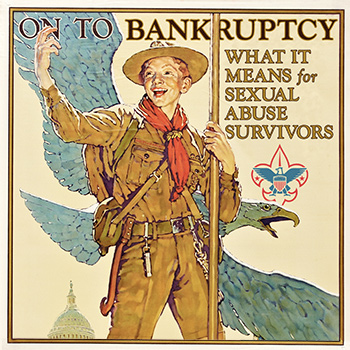
As greater numbers of childhood sexual abuse survivors have come forward with their stories, pressure is mounting on schools, churches, and other institution to properly compensate survivors for their pain and suffering. These institutions are now facing massive financial liabilities, because of the sheer number of survivors who are now filing suit against them. Unfortunately, some of these institutions are unable to offer survivors the compensation they deserve.
Why The Boy Scouts of America Filed for Bankruptcy
One such organization is The Boy Scouts of America (BSA) who, in February of 2020, filed for Chapter 11 bankruptcy (also known as a financial restructuring). This strategic decision was made in an effort to salvage and preserve what they can of BSA assets amidst the settlements they will have to pay out to survivors who endured sexual abuse by staff members and scout troop leaders. This filing means that any existing lawsuits against the BSA will be transferred to bankruptcy court and resolved there. Bankruptcy filings are also an attractive option for organizations facing negative media attention and public upset, as settling cases in bankruptcy court often doesn’t require trials. This can lessen damage to their reputation and, ultimately, lead to better public perception and trust.
Benefits of Bankruptcy Court for Survivors
Bankruptcy can have drawbacks for survivors wanting to pursue legal action against the BSA, the biggest being that the BSA’s financial liability to survivors could be capped, meaning survivors may receive a lower settlement than in traditional court. Bankruptcy settlements do, however, have some real benefits to survivors. Bankruptcy court is typically a more streamlined process, meaning that survivors should have an easier time proving their cases than in standard court proceedings. Survivors are also less likely to have to attend court hearings, which can be emotionally painful and exhausting. Another big advantage is the increased anonymity for survivors. For many survivors, coming forward with their stories of abuse is one of the hardest parts of their journey, and this can be especially intimidating if survivors are anxious about appearing in public. Fortunately, most bankruptcy courts allow survivors to remain completely anonymous throughout the process. Survivors are also not typically required to participate in a deposition, the process of legal questioning, which can be an intimidating experience for many. For survivors thinking about coming forward, it is important to know that their ability to seek justice ends once the bankruptcy case has been closed. Chapter 11 is meant to settle all outstanding liabilities and debts, so if a survivor does not come forward soon they could forever lose their right to seek compensation from the BSA in the future. It is also important for survivors to work with a lawyer before appearing in court, to ensure they present the best case possible and maximize their compensation.
The Big Picture
Like the BSA, at least 24 U.S. Catholic dioceses and religious orders have also filed for bankruptcy protection during the ongoing sexual abuse crisis. That number is likely to grow, which means that survivors can expect to see many of their cases settled in bankruptcy court. Read about what bankruptcy means for the Catholic Church. If you have any questions about what this means for your case, or are a survivor of childhood sexual abuse, our team of compassionate and dedicated lawyers wants to help.
